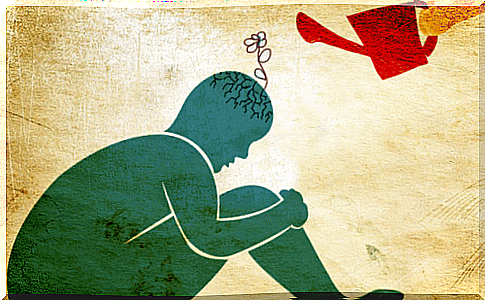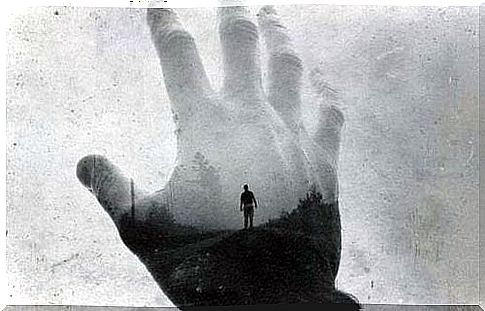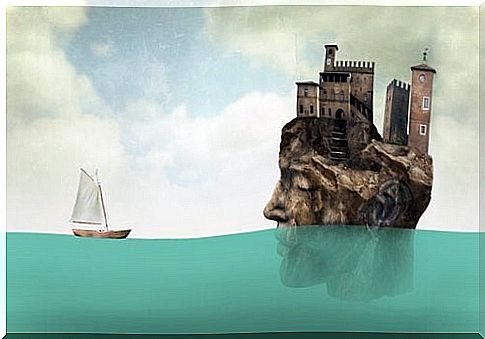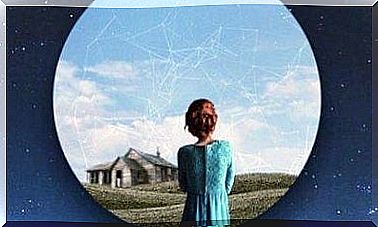The Pillars Of Jungian Anxiety Therapy

Jungian anxiety therapy is based on a central prerequisite: Our thoughts and beliefs can be our main enemies, especially when we defend ourselves or do not know how to deal with what paralyzes us and what worries us. Conversely, if we accept them and deal creatively with the root of the problem, we can free ourselves from the burdens involved.
If there is one key word that defines this psychological approach established by Carl Gustav Jung, it is self-actualization. One aspect that always set the Swiss psychiatrist apart from Sigmund Freud’s assumptions was his belief that man directs his life towards the sole goal of fulfilling himself as a person.
But we have been exposed to fear for generations and generations. And the reason why this is so already seemed clear to Jung: The world does not always seem a safe place to us.
“The psychotherapist must view each patient and each case as something new, unique, wonderful and extraordinary. Only in this way can he come closer to the truth. “
Carl Gustav Jung
The entire social fabric that surrounds us, the institutions, the authorities and even the flow of modernity in which we move on a daily basis do not constitute a favorable scenario. In addition to this constant feeling of insecurity, there is psychological dissatisfaction, the feeling that we are not free, that we cannot fully realize ourselves as human beings. These circumstances wear us down and, far from accepting that inner tension, we choose to stoically resist. But as Carl Gustav Jung told us again and again, what we oppose remains.

The Keys of Jungian Anxiety Therapy
Jungian anxiety therapy is a special form of psychotherapy that differs significantly from the most common in its methodology, such as B. cognitive behavior therapy or humanistic therapy. However, universities like the University of California (California, USA) have regularly trained students in this approach for more than 40 years.
Now , if we wonder whether it is effective in dealing with anxiety, the answer should be that it rests on stable pillars that we should be interested in.
1. The hypothesis: fear is a human quality, but it must be individualized
Jungian anxiety therapy uses concepts such as archetypes and the collective unconscious to substantiate ideas: People share a psychological substrate in which elements arise that define us all. There are instincts, drives, shadows that we would all exhibit equally:
- Fear is the carpet we all move on every day. It is an emotion that is charged with the suffering that emanates from the above: the feeling that we live in an environment that is not always safe.
- Well, despite the fact that we all humans share this dimension, latently or overtly, we are obliged to individualize ourselves. The point is to stand out from this fabric on which we walk in order to understand ourselves as autonomous and independent beings.
- In this way, every person who has to deal with fear on a daily basis must be able to define what he perceives, what he feels, what he needs.
Jungian Anxiety Therapy uses a narrow methodology, a dialectical procedure in which the therapist must be able to connect with the patient’s personality in order to increase their comfort and autonomy. The patient should perceive himself as an active part of his healing.

2. Recognizing the shadow or deep roots of fear
Another key to the success of Jungian Anxiety Therapy is finding the cause of the patient’s condition. The root of the problem that causes this mental ailment. The aim is to recognize his shadow, that dark side of his personality that is supposed to come to light. For this it is necessary that the therapist identifies the affective complexes (needs, obsessions, feelings of admiration …) of the patient.
To achieve this, these strategies are followed:
- Conversation therapy
- Association of ideas
- Creative techniques
- Dream interpretation
The patient must form an alliance with the therapist in order to make his unconscious accessible. Knowing what underlies this complex psychological structure, so often riddled with knots, gaps, and neglected needs, is the key to recovery.
3. Breaking through resistance: accepting freedom
Jungian anxiety therapy has only one purpose, that of individualization. Fostering this psychological and emotional autonomy requires that the patient be empowered to break with resistance, to stop this desire to flee from what worries or scares them.
The fear is confronted, the agony is alleviated by recognizing it and depriving it of the power it has over our bodies and minds. Only when we stop will we be able to reveal a stronger and brighter selves.
According to Carl Gustav Jung, the more we try to put a negative or disturbing thought aside, the more power it will gain over us. Therefore, denying or resisting such thoughts could infinitely worsen the symptoms associated with fear : more nerves, more restlessness, more excitement.
Jungian anxiety therapy, in turn, tries to guide the patient in such a way that he can accept a very important aspect: that fear is part of the human being and that it must therefore be accepted without resistance. But let’s not let them come to power, because then we’ll lose our autonomy.

Find a purpose
Jungian anxiety therapy is aware that we more or less often exhaust our energy reserves. There are many people who suffer from chronic hopelessness and this lack of motivation, which almost always starts from the same point: the lack of a purpose, a meaning from which the meaning would be born.
This type of therapy offers people the appropriate means to develop a new, vital approach. In this way, it makes it easier to define a living purpose that is adapted to one’s own needs. In this way and starting from that inner sense , we can reduce restlessness and fears in order to direct our energy towards personal goals.
In conclusion, it remains to be said that Jungian anxiety therapy is another psychological approach in the spectrum of therapies available to us. Restoring the emotional balance out of our unconscious, our blockages, fears and shadows is another strategy that we should give a chance. It is also worth noting that Jungian anxiety therapy has recently been evaluated in various studies that support its effectiveness.
It remains interesting to embark on this type of therapeutic journey that promotes self-awareness and personal freedom.









